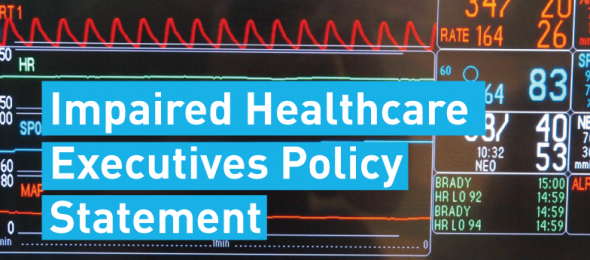The American College of Healthcare Executives (ACHE) updated their policy statement on Impaired Healthcare Executives in November 2012. We posted here on impaired physicians,but have not posted previously on impaired executives. The Joint Commission (TJC) requires that all hospitals have a process in place to identify and assist staff physicians with health and behavior problems.
On its website, the ACHE Statement of the Issue begins:
The American College of Healthcare Executives recognizes that impairment is a significant problem that crosses both societal and professional boundaries. For healthcare executives, impairment can be defined as a condition that limits or diminishes a healthcare executive’s ability to perform his or her responsibilities and duties in accordance with the prevailing professional standards and expectations. Some examples of causes of impairment include alcoholism, substance abuse, chemical dependency, mental/emotional instability, cognitive impairment and illness.
The Policy Position references the preamble of the ACHE Code of Ethics which states, “Healthcare executives have an obligation to act in ways that will merit the trust, confidence, and respect of healthcare professionals and the general public. Therefore, healthcare executives should lead lives that embody an exemplary system of values and ethics.”
The updated policy statement asserts healthcare executives have the following ethical and professional obligations:
- Maintain a personal health that is free from impairment.
- Refrain from all professional activities if impaired.
- Seek assistance, whenever there is uncertainty, in understanding whether impairment exists.
- Expeditiously seek treatment if impairment occurs.
- Urge impaired colleagues to expeditiously seek treatment and to refrain from all professional activities while impaired.
- Support peers who identify healthcare executives in need of help.
- Intervene and report the impairment to the appropriate person(s) should the colleague refuse to seek professional assistance and should the state of impairment persist.
- Review applicable legal obligations to report the impairment to ensure compliance with federal and state requirements (such as those required by licensing boards).
- Recommend or provide, within one’s employing organization, confidential avenues for reporting impairment, and either access or referral to treatment or assistance programs.
- Consider establishing an organizationwide program or committee that coordinates a reporting process and also reviews, addresses and prevents impaired executives.
- Recognize that individuals who have successfully received treatment for impairment and are no longer deemed impaired should be considered for employment opportunities for which they are qualified.
- Assist recovering colleagues when they resume their professional activities.
- Urge the community to provide information and resources for assistance and treatment of alcoholism, substance abuse, mental/emotional instability and cognitive impairment as needed and as appropriate.
- Raise the awareness of key stakeholders (such as employees, governing board members, etc.) on impairment issues and the resources available for assistance.
A study published in the Journal of the American Medical Association (JAMA) conducted by researchers from Massachusetts General Hospital found more than 31 percent of the 2,000 doctors who responded don’t turn in colleagues who are impaired or incompetent. The study surveyed nearly 3,000 doctors across multiple specialties. The survey reported that 17 percent of surveyed doctors had encountered an incompetent or impaired colleague in the past three years. Only two-thirds actually turned those doctors in and 69 percent of doctors said they had knowledge of the process for reporting a colleague who was compromised.
 Holly Hayes is a mediator at Karl Bayer, Dispute Resolution Expert where she focuses on mediation of health care disputes. Holly holds a B.A. from Southern Methodist University and a Masters in Health Administration from Duke University. She can be reached at holly@karlbayer.com.
Holly Hayes is a mediator at Karl Bayer, Dispute Resolution Expert where she focuses on mediation of health care disputes. Holly holds a B.A. from Southern Methodist University and a Masters in Health Administration from Duke University. She can be reached at holly@karlbayer.com.












